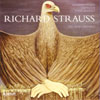Strauss, R Metamorphosen; Capriccio Prelude; Piano Quartet
Lesser Strauss, maybe, but the Nash make an enjoyable case for it
View record and artist detailsRecord and Artist Details
Composer or Director: Richard Strauss
Genre:
Chamber
Label: Hyperion
Magazine Review Date: 3/2007
Media Format: CD or Download
Media Runtime: 78
Mastering:
Stereo
DDD
Catalogue Number: CDA67574

Tracks:
| Composition | Artist Credit |
|---|---|
| Metamorphosen |
Richard Strauss, Composer
Nash Ensemble Richard Strauss, Composer |
| Piano Quartet |
Richard Strauss, Composer
Nash Ensemble Richard Strauss, Composer |
| Capriccio, Movement: Prelude (string sextet) |
Richard Strauss, Composer
Nash Ensemble Richard Strauss, Composer |
Author: Arnold Whittall
The early and late Strauss on this finely recorded disc are separated by some 60 years: the Piano Quartet was completed in 1884, the year after Wagner's death, while Metamorphosen dates from the early months of 1945. Strauss at 20 had abundant promise: Strauss at 80 had managed to avoid lapsing into self-parody. The result is full of interest.
The Piano Quartet is invariably labelled “Brahmsian” and the opening makes that association clear. Yet the piece is too loosely put together, too focused on small-scale harmonic effects, to sound like Brahms for long. Anyone looking for evidence that Strauss's true metier would be programme music and opera need look no further. It's an enjoyable piece for all that, expansively dramatic and genuinely expressive fi with that touch of spontaneity which signals Strauss at his best.
The Nash Ensemble bring affectionate fervour to the Quartet, without lingering excessively over its creakier transitions. With the Capriccio Prelude and Metamorphosen I would have preferred a cooler touch - the latter in particular risks overheating, with uniformly high dynamic levels. The status of this version of Metamorphosen is ambiguous, since it derives from a draft discovered in 1990. This preceded the final scoring for 23 solo strings, and one wonders if Strauss might not have revised the former in light of the latter had he wished to preserve it - especially the very awkward harmonic switch at the end, which the final version eliminates. A curiosity, then, which inevitably sounds more like a dilution of the familiar score than a genuine alternative.
The Piano Quartet is invariably labelled “Brahmsian” and the opening makes that association clear. Yet the piece is too loosely put together, too focused on small-scale harmonic effects, to sound like Brahms for long. Anyone looking for evidence that Strauss's true metier would be programme music and opera need look no further. It's an enjoyable piece for all that, expansively dramatic and genuinely expressive fi with that touch of spontaneity which signals Strauss at his best.
The Nash Ensemble bring affectionate fervour to the Quartet, without lingering excessively over its creakier transitions. With the Capriccio Prelude and Metamorphosen I would have preferred a cooler touch - the latter in particular risks overheating, with uniformly high dynamic levels. The status of this version of Metamorphosen is ambiguous, since it derives from a draft discovered in 1990. This preceded the final scoring for 23 solo strings, and one wonders if Strauss might not have revised the former in light of the latter had he wished to preserve it - especially the very awkward harmonic switch at the end, which the final version eliminates. A curiosity, then, which inevitably sounds more like a dilution of the familiar score than a genuine alternative.
Discover the world's largest classical music catalogue with Presto Music.

Gramophone Digital Club
- Digital Edition
- Digital Archive
- Reviews Database
- Full website access
From £8.75 / month
Subscribe
Gramophone Full Club
- Print Edition
- Digital Edition
- Digital Archive
- Reviews Database
- Full website access
From £11.00 / month
Subscribe
If you are a library, university or other organisation that would be interested in an institutional subscription to Gramophone please click here for further information.




